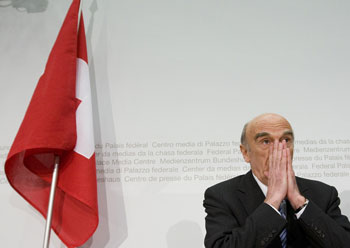NEW YORK - A flamboyant Finance Minister of an Asian country once boasted to a group of friends at the UN delegate's lounge, the designated watering hole for diplomats, that his inexpensive Japanese wrist watch was really worth over a million dollars. But what was the catch?
Pointing to the cheap watch which was programmed to store phone numbers, he said he did one better: he keyed both his password and his Swiss bank account number, perhaps hiding some of his white collar crimes and corrupt deals on his wrist. Obviously, he was a politician right down to his finger tips.
But those were the bad old days -- the roaring 1970s -- when a Swiss bank account was not only a safe haven for ill-gotten gains but also an international status symbol to be flaunted in public.
The numbered account was considered so sacred that politicians, businessmen and stockbrokers were perversely confident of depositing all their secret wealth in a place unreachable by the long arm of the law. But no more because that long arm has apparently grown longer.
 |
| Swiss President and finance minister Hans-Rudolf Merz arrives for a news conference on the UBS in Bern on Thursday. Shares in Swiss banking giant UBS AG rose 3 percent on Thursday after it agreed to pay $780 million and identify certain American clients to settle criminal fraud charges in the United States. Reuters |
Last week, the US Department of Justice came down heavily on Switzerland-based UBS, described as one of the world's largest private banks, which had aided and abetted wealthy Americans to hide their money from the Internal Revenue Service and skip paying taxes.
Admitting guilt, UBS has agreed to pay a hefty $780 million in penalties and has also been forced to reveal the names of all its US clients who are liable for punishment for tax evasion under American law.
Initially, UBS agreed to turn over the names of about 250 of its American clients. But that was not good enough to the Justice Department, which has demanded the names of some 52,000 clients -- and growing. If UBS fails to concede to the request, some of its top executives could be liable for indictment in US courts on conspiracy charges.
According to email messages tracked down by the Federal Bureau of Investigations (FBI), the stealthy transactions were mostly in coded language that only the clients and bankers could decipher. But all that went public last week.
The phrase "one nut," for example, meant $250,000 and "one swan" meant $1 million. The world's major currencies were colour coded: orange for the euro and blue for the sterling pound.
The FBI says off-shore deposits of US clients at UBS may have exceeded a staggering $20 billion depriving the US government of about $300 million in federal taxes annually.
The UBS scandal has also prompted a crackdown on some of the world's notorious tax havens, including Liechtenstein, Cayman Islands, Andorra, Monaco, Jersey and the Isle of Man, along with several tiny islands in the Caribbean.
The need for more oversight of these tax havens will be on the agenda of the G20 summit meeting -- to be attended by some of the major developed and developing nations -- in Britain in April.
The Western world has traditionally dismissed corruption as essentially a congenital disease afflicting developing nations. The stories of bribery and corruption in the Third World are legendary -- and usually splashed across newspapers in the West.
But the argument that corruption is mostly pervasive in developing nations has been publicly refuted -- time and again. "Corruption was not limited to Third World countries but often had its roots in the entrepreneurial practices in liberal democracies," Antonio di Pietro, an Italian magistrate once argued. "Corruption is like a coin," he said, "It has two sides: one side is the corruptor and the other the corrupted."
If bribery and corruption take place in arithmetic proportions in developing nations, they assume geometric proportions in the world's richer countries.
The phenomenal growth of corruption -- including corporate fraud, tax evasion, stock manipulation and insider trading -- is really giving capitalism a bad name both in the US and in Western Europe.
But since the law in most countries is heavily weighted against the poor, the rich white collar criminals usually get out with minimum punishment for their multi-million dollar crimes. Or they hire hotshot lawyers -- as in the United States -- to help wriggle them out of loopholes in the law.
Perhaps the most telling comment came from Senator Patrick Leahy, chairman of the Senate Judiciary Committee. He denounced corporate executives who wreck their companies "and walk away scot free" with millions of dollars as compensation.
"The comfort might be a little bit less if, instead of a very large mansion, they're in a 12-by-12 jail cell behind steel doors." | 
